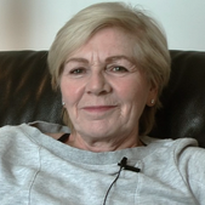Linda

Linda is part of two birth cohort studies in which she has completed multiple questionnaires. She has a positive attitude towards medical research, having taken part in several studies. She encourages others to consider participating in similar studies.
Linda is married and has two children. She is a retired public health officer. Her ethnic background is White Scottish.
More about me...
Linda is part of two birth cohort studies and cannot remember much about participating. She does, however, remember joining the study at school and doing verbal reasoning tests. She believes that she did well at these tests as she was rewarded with dried exotic fruit. More recently, she remembers going to a workshop with other people who were involved in one of the birth cohort studies where participants were split into groups and discussed their experiences of childhood. She found this interesting because they all had shared experiences of their childhood, despite going to different schools. Linda is uncertain but she believes that she may have completed questionnaires as part of these studies which were related to her general health.
The researchers from both birth cohort studies have kept in touch with Linda by sending her regular surveys and Christmas cards. There is usually a choice to do the surveys online or by post, but Linda is choosing to do them via the internet as she feels that it is easier for the research team. That said, Linda never received any feedback from the study teams when she was a child as she imagines it went to her parents. As an adult, however, she has received general information from the research team about the studies’ findings and has attended two feedback events about how the data had been used and future plans, which helped her to feel her involvement in the study was worthwhile.
Linda has a positive attitude towards medical research and she is “very keen” to take part because of its importance. She is willing to take part in further studies, including a drug trial for a memory clinic, because she believes that medical research will benefit herself and society. She thinks that research is the only way to improve health services and learn about how to overcome various illnesses. Her good health and job security have also driven her passion to “give as much back as I can” and even led to her decision that she will one day leave her body to science. For this reason, Linda described herself as a “serial participant”.
Interview conducted in 2019.
Linda felt it was appropriate that most of the feedback is about the findings of the birth cohort in general, rather than about her as an individual. She had also taken part in a separate study at a memory clinic.
Linda felt it was appropriate that most of the feedback is about the findings of the birth cohort in general, rather than about her as an individual. She had also taken part in a separate study at a memory clinic.
It’s been more sort of general what they found. You’re never going to, apart from the memory clinic stuff, it’s never been personal feedback about what you’ve done, but that, that’s okay because you can’t have it both ways. You can’t be anonymous in a study and expect to get feedback, so it’s, yeah, you just know that it’s going into a collective pool to be used for whatever purpose.
But what about getting sort of feedback about the study, sort of in general, have you got those?
Well, I think it’s always been made available. You can go on the websites and things if you’re so interested. I think I’ve definitely been sent stuff to read. Maybe once a year you get, you get some feedback and I’ve probably read it, but then just put it to one side. In terms of retention for me, I’ll have moved onto the next thing.
Linda attended an event to mark a milestone for a birth cohort study. She found it interesting talking to other participants and reflecting on their upbringings.
Linda attended an event to mark a milestone for a birth cohort study. She found it interesting talking to other participants and reflecting on their upbringings.
That’s right we had discussions in groups, and we were mixed up. We weren’t, you weren’t sitting necessarily with people that you were at school with. Although we did meet up with people we were at school because I think they did, they did our school, they did a photograph of groups of people from different schools, I remember that. It was quite, it was quite general discussions. I don’t think, I can’t remember if we had topics that we had to discuss on the table, but it was basically just going round the room and just talking about our experiences of growing up in the fifties, what it was like; our schooling, you know, our homelife. Just, just how different it is to, you know, children growing up today really. I mean, it’s so totally different.
What it was like to grow-up and live in the 1950’s
I mean when you think about it, the war had only been finished a few years earlier. I think by the time I was born rationing was finished, but yeah, so it was, times were tough.

